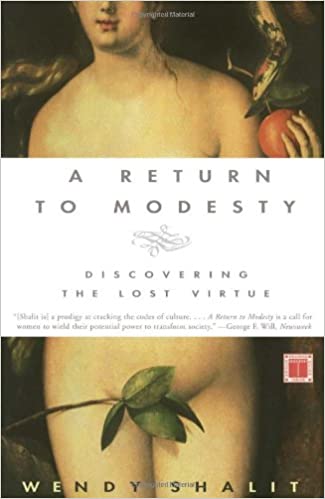How Modesty Preserves the Erotic
Does modesty help our sexuality remain meaningful and significant rather than banal and trite? Wendy Shalit believes the answer is yes.

The book’s central theme is that, far from downgrading sexuality, modesty preserves the significance and even the excitement of sexual love. Her argument is incapsulated in a quote from Havelock Ellis that features in Chapter 5:
"Without modesty, we could not have, nor rightly value at its true worth, that bold and pure candor which is at once the final revelation of love and the seal of its sincerity."
Shalit goes on to offer the following commentary:
“In essence, a culture that respects a specifically female type of modesty is one that regulates and informs the relation between the sexes in a nuanced—not, significantly, in a legislated—way. Women who dress and act ‘modestly’ conduct themselves in ways that shroud their sexuality in mystery. They live in a way that makes womanliness more a transcendent, implicit quality than a crude, explicit quality…. It is a respect for this ‘power within’ that once made it impossible for men to view women merely as sexual objects. Rather, women became something deeper, more elemental: possessors of a deep and wondrous secret that is revealed only to the one who proves himself deserving of her.”
It goes without saying that we no longer think like this today. But one of the paradoxes of our age is that as immodesty has become normalized, our sexuality has not become more significant but less. Shalit shows that as sexuality ceases to be a big deal, intimacy becomes less pleasurable. This is the entire thesis of chapter 10, titled “Modesty and the Erotic,” some of which I have summarized in my earlier article, “Modest, Religion, and Sexual Fulfillment.”

One of the teachers Shalit cited was Rabbi Manis Friedman, author of Doesn’t Anyone Blush Anymore? Reclaiming Intimacy, Modesty and Sexuality. In his book the rabbi shared an anecdote that illustrates the relationship between modesty and the erotic. Some young people asked his advice about a forthcoming camping trip. Friedman was horrified to learn that these campers had no scruples sharing sleeping bags with members of the opposite sex. When he challenged the young people about this, they assured him that “there’s nothing sexual about it.” Think about that for a minute: is it true that there can be “nothing sexual” in just sharing a sleeping bag with someone of the opposite sex? The same question might be asked of other activities, such as using co-ed bathrooms or participating in co-ed wrestling. For many young people today, the answer is genuinely yes: there is nothing sexual in such activities. The strangeness inherent in things like co-ed dorms, co-ed bathrooms, co-ed wrestling and even co-ed sleeping bags, is not that such things exist, but that they can exist without sexual connotations. This can only be achieved to the extent that gender has been emptied of its implicit sexuality, or where the link between our body and our sexuality has been partially severed if not completely eroded.
At least, that was Shalit's argument, and she believes this has implications for swimwear. Consider that bikinis are sometimes defended on the grounds that the women who wear them as swimming suits are not trying to be provocative and that this attire is only sensual if you perceive it to be. If this is true then it only shows how desexualized we have become, for if the female body can be almost entirely revealed without the presence of erotic overtones then this signifies not only a reduction of sexuality, but a full-scale repression of it, a severing of the important link between the body and the erotic, and an emptying out of the elemental sexuality that modesty recognizes.
Perhaps God never intended for the naked body to be demystified like this. Perhaps seeing someone of the opposite sex in a state of undress was never meant to be disengaged from its sexual connotations and to become merely ‘ordinary.’ At least, that is what Shalit argues.
If you aren’t convinced, buy yourself a copy of A Return to Modesty: Discovering the Lost Virtue. It is as relevant today as it was when it was first published in 1999.
Robin Phillipshas a Master’s in History from King’s College London and a Master’s in Library Science through the University of Oklahoma. He is the blog and media managing editor for the Fellowship of St. James and a regular contributor to Touchstone and Salvo. He has worked as a ghost-writer, in addition to writing for a variety of publications, including the Colson Center, World Magazine, and The Symbolic World. Phillips is the author of Gratitude in Life's Trenches (Ancient Faith, 2020) and Rediscovering the Goodness of Creation (Ancient Faith, 2023) and co-author with Joshua Pauling of Are We All Cyborgs Now? Reclaiming Our Humanity from the Machine (Basilian Media & Publishing, 2024). He operates the substack "The Epimethean" and blogs at www.robinmarkphillips.com.
• Get SALVO blog posts in your inbox! Copyright © 2026 Salvo | www.salvomag.com https://salvomag.com/post/returning-to-return-to-modesty


















